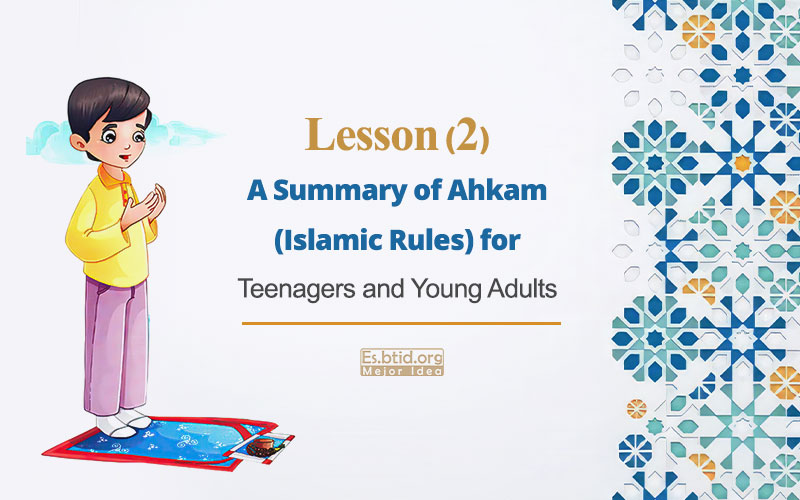Ahkam: It is a set of rules and guidelines that a Muslim must act within. Like the branches of religion (prayer, fasting, zakat, khums, hajj, jihad, enjoining the good, forbidding the evil, Tawalli, Tabarri).

Ahkam (Islamic Rules)
Click to Lesson (One)
(Lesson “2”)
Ahkam (Islamic Rules):
It is a set of rules and guidelines that a Muslim must act within. Like the branches of religion (prayer, fasting, zakat[1], khums[2], hajj, jihad, enjoining the good, forbidding the evil, Tawalli[3], Tabarri[4]).
Note 1: This text is prepared based on Fatwa (Orders) of Ayatollah Khamenei.
Note 2 : Most of these rulings are common to all Foghahas (Islamic Jurisprudents). After reading this text, you can refer to your Marja’s (Jurisprudent) treatise. But due to the simplicity and brevity of this text, it is recommended to learn these rules first and then refer to your reference treatise for more accuracy.
Terminology of Islamic Ahkam
The five Ahkam (Islamic commands):
-
Wajeb (obligatory):
It is something that is necessary to do. It is a sin to leave it and is punishable. like praying
-
Haram (Forbidden):
An action that needs to be abandoned and its doing is punishable; such as lying, oppress etc.
-
Mostahab (Recommended):
It is something that is good and desirable to do and there is no punishment for leaving it; Like greeting and giving charity
-
Makrooh (detested):
It is something that is better not to do; Like puffing food and eating hot food.
-
Mobah (Allowed):
It is one thing to do or not to do; There is neither punishment nor reward; Like walking and sitting.
Sources of religion and Islamic Ahkam:
- Quran:
It is the main source of Ahkam and Religion.
- Sunnah:
Sayings, actions and affirmations of the the Prophet (a.s) and the Infallible Imams (a.s).
- Wisdom
- Ijmaa (consensus of scholars and Islamic Jurists)
Other Terminology of Islamic Ahkam
- Laws or Fiqh: (Practical orders of Islam)
The rules that tell us what we should do and what we should not do.
- Taklif (Task):
All boys reach the age of Taklif at the end of age 15th , and girls at the end of 9th (Some of the Marjas consider 13th)[1] of the lunar years, must fulfill their religious duties. Of course, some boys and girls reach the age of Taklif before this time.
Explaination of Terms:
[1] Islamic Charity
[2] Islamic Tax
[3] To comrade the followers of God
[4] To repudiate the enemies of God



